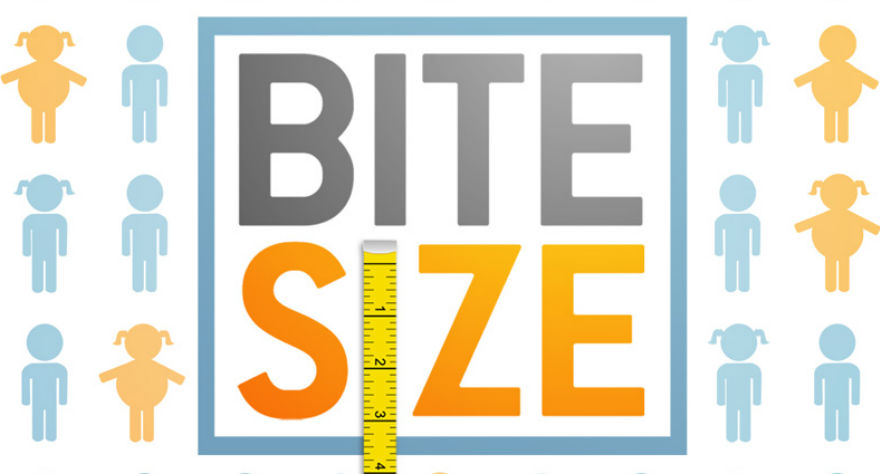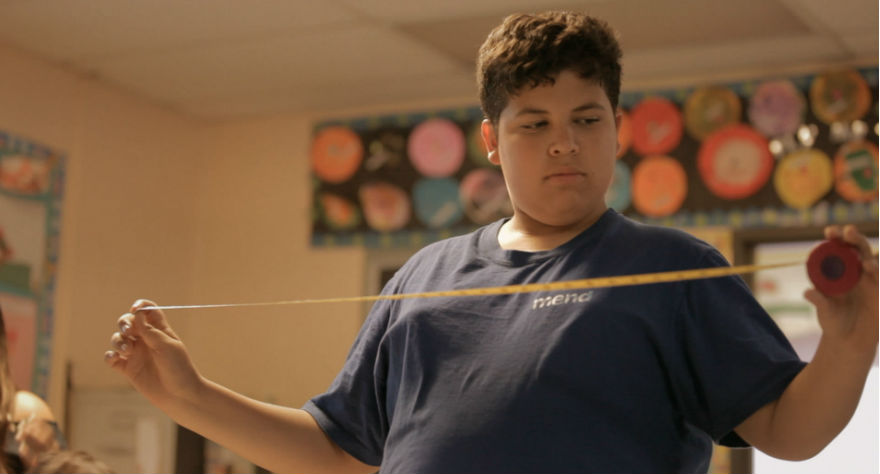Corbin Billings Talks ‘Bite Size’, Childhood Obesity, His Love For Nintendo

The issue of childhood obesity is complex, but Corbin Billings’ empowering, educational documentary, Bite Size, explores all facets of the widespread epidemic through the lives of four children from across the U.S. fighting to stay healthy. Davion loves football, but struggles to perform due to his fight with diabetes; KeAnna and her friends in her girls’ health group Si Se Puede have self-image issues; Moyses is constantly pressured by his antagonistic father, Felipe, to lose weight, despite Felipe setting a bad example with his junk-food eating habits; Emily lost a lot of weight at camp, but has trouble keeping it off at home.
Understanding and education are the most powerful tools we have to combat childhood obesity, and Bite Size helps to expand our knowledge on the subject while we get to know its remarkable young subjects. In our interview we speak to Billings about how far the kids have come since filming the movie; the film’s upbeat tone; what makes Bite Size different from other docs about obesity; his love for Nintendo; the tricky business of criticizing somebody’s weight, and more.
Watch the film now at bitesizemovie.com and Vimeo. On March 24th, the film will be available on iTunes, Google Play, Amazon Instant, VUDU, and DVD.

How’s press going for the movie?
Excellent. It’s been a whirlwind these past couple days. We just screened the film in Mississippi, where we filmed two of the four stories. I finally got to share the film with those kids last night. I’m on cloud nine, so we’re in a good spot for this interview! [laughs] Everyone responded to the film really well, which was gratifying. I went to school for film at USC, and we filmed Moy’s story in East L.A. because we were sort of fresh out of college, looking for what was within our reach. When I learned that we were going to have a screening at USC in Norris theater, where I literally learned how to make movies, it was this full-circle boyhood dream come true. Moy was there with his family, and it was this incredible evening. Moy has aspirations to go into film, so he was totally overwhelmed to be a part of that experience. When you follow people around [with a camera] and are borderline invasive in their lives, telling a lot of their story through their down points, it’s nice to see people look back on it and say, “It was worth it.” Then I took a redeye out to Mississippi to screen it for KeAnna and Davion, and it was the same experience. And I got to freestyle rap with Davion! [laughs]
The film is educational, but the kids are also super entertaining, really interesting people.
When we were making this film, we encountered a lot of closed doors because there were other documentaries coming out on the subject. One of them was Weight of the Nation by HBO. It was a four-part series, and one was called “Children in Crisis.” The tagline was something like, “Four kids from across the country struggle with their weight.” You’ve got to be kidding me! We’re in the middle of making our movie, and there’s this other series coming out. I watched it, and it was interesting: they talk to the parents, they talk to doctors…the kids themselves never spoke. That’s when I really understood what Bite Size was and what made it different from other documentaries. There are a lot of different documentaries on obesity, but there’s only one KeAnna, Davion, Moy and Emily.
How did you find them?
A little serendipity and a lot of dumb luck. Back in the day, me and the producers sat around the table and said, “What would be some nice storylines to have?” One of them said, “It would be so good to find a kid from the South who loves football, but at the same time is struggling with diabetes.” It’s like, yeah, that’s great, but how in the world are we going to find that person, you know? Lo and behold, we found Davion.
The storyline that really struck me was Moyses’. He and his dad’s relationship is pretty fascinating.
I did not anticipate Felipe being as big a character in the film as he was. We didn’t get that parent/child relationship in the other storylines. Not to say that the other parents weren’t active, but they weren’t antagonistic like Felipe. You can totally tell this guy loves his kid, but he’ll take any opportunity to jab at him. I said to him, “Moy’s going to look like an only child in the movie, because his brothers aren’t showcased.” His response was, “Well, he ate his brothers.”
Oh god…
Yeah. You know, I had to just laugh and go, “You’re an asshole, but…” [laughs] And talk about timing: We were there filming as Felipe suffered from a stroke. I was sitting there going, what is going on right now? It was a real wake-up call for their family. It allowed us to teach this great message with Moyses’ story, which is that kids can initiate change in their parents.
There’s a really positive vibe to the movie, from the music choices, the humor and so on. Talk about the importance of not making a downer of a film.
Oh yeah, sure. It was a delicate balance of not letting the sad moments weigh the film down. As you said, the music helps with the empowering tone. I also have to say that a lot of the tone comes from the editing. There’s that great scene where Moy’s camping with his family and he’s watching everyone else play football. He doesn’t want any part of it, and he and his dad have issues at that point. But then we close the film with he and his dad playing football out in the front yard. Being able to look at these puzzle pieces in the editing room and bring them together full-circle was fantastic.
How’s Davion doing?
It amazes me; he no longer has to take medication for his diabetes. It’s been a complete lifestyle change for him. Football led him to lifting weights, and he’s like the little engine that could. The way the film ends with him saying, “The struggle won’t be over until I’m dead and gone,” is simultaneously realistic—and sometimes the reality can be really grim—and inspirational. It’s a tightrope walk. Such is life. That was my experience, even. I’ve been a fat kid, ridiculed from 3rd grade through college. It wasn’t until I graduated from USC—I was 265 pounds at graduation, about 60 pounds heavier than I am now—that I lost weight. I always say that graduating from film school is like being helicoptered out into the middle of the ocean, and being told, “There’s land in some direction. Now swim!” I realized what I actually had control over, which was not my career in Hollywood, was my body. Lo and behold, I got into Wii Fit. I’d always been a video gamer, playing Nintendo relentlessly, and once my body was the controller, I sucked! But I kept doing them over and over, and I lost 20 pounds.
Speaking of Nintendo, it was great to see Moyses and Felipe playing The Legend of Zelda on an original NES.
You know, from the very first moment I met Moy, I identified most strongly with him. He’s essentially me as a kid. Since he was the first star that we followed, it was really wonderful and cathartic for me to help his confidence and see him grow. The most dramatic change I saw with any of the kids was his level of confidence. When I first met him, he would shy away in the corner. He was reading an e-comic about Barack Obama and Ash from Evil Dead fighting zombies. That’s when I was like, this is the kid! He was shy, but now he’s up in front of everybody at Q&As answering questions about his life. But yeah, his love for Nintendo was something we bonded over.
Criticizing somebody’s weight is a very complicated thing. We’re all in agreement that being obese is bad, but there’s also the popular thought in society that you should embrace however you look, no matter what shape you are. You want to say, “Yes, you look great,” but if you’re unhealthily overweight, that definitely a bad thing.
Okay…this is super complicated. The fact of the matter is, people’s body chemistry is composed differently. Somebody could live a healthy lifestyle and maintain some of that mass. That being said, that’s not the case for everybody, and there’s a tendency to fall behind that idea. With Si Se Puede, there’s a poignant scene where the girls are getting their BMIs recorded, and they don’t want to admit they’re obese, even though that’s their measurement. They say things like, “I love my weight.” While there are people whom that’s true for, what we see is that that perspective becomes a defense mechanism. It’s saying, “I love myself, so I don’t care what you say about me.” But that’s an inherently defensive position. You’re saying that being backed up into a corner. We exist in a culture that stigmatizes based on weight. Being called “chubbs” as a kid weighed on me. I hated that nickname. There was this part of me saying, “I’m good at whatever size I am,” but the fact of the matter is, I wasn’t, truly. It was a burden I carried on my shoulders. Measuring success in this film is not in terms of weight loss physically, but shedding emotional weight. There’s a culture of fat-shaming, and you want to make sure that you approach the issue with emotional intelligence. They’ll be open to change because they feel better about it.
